Analyzing the Benefits and Drawbacks of Global Business on Vodafone
VerifiedAdded on 2020/10/05
|31
|6363
|321
Report
AI Summary
This report examines the impact of globalization on Vodafone, a multinational telecommunications company. It investigates the benefits of operating in a global business environment, such as market expansion, increased employment opportunities, and enhanced brand reputation. The report analyzes how Vodafone utilizes lean production practices to expand its business internationally and identifies key advantages like access to resources and a broader customer base. Furthermore, it addresses the drawbacks faced by Vodafone due to globalization, including challenges in supply chain management, adapting to varying customer demands, and navigating diverse regulatory environments. The report also provides recommendations for Vodafone based on the research outcomes, including a reflection on alternative research methodologies.
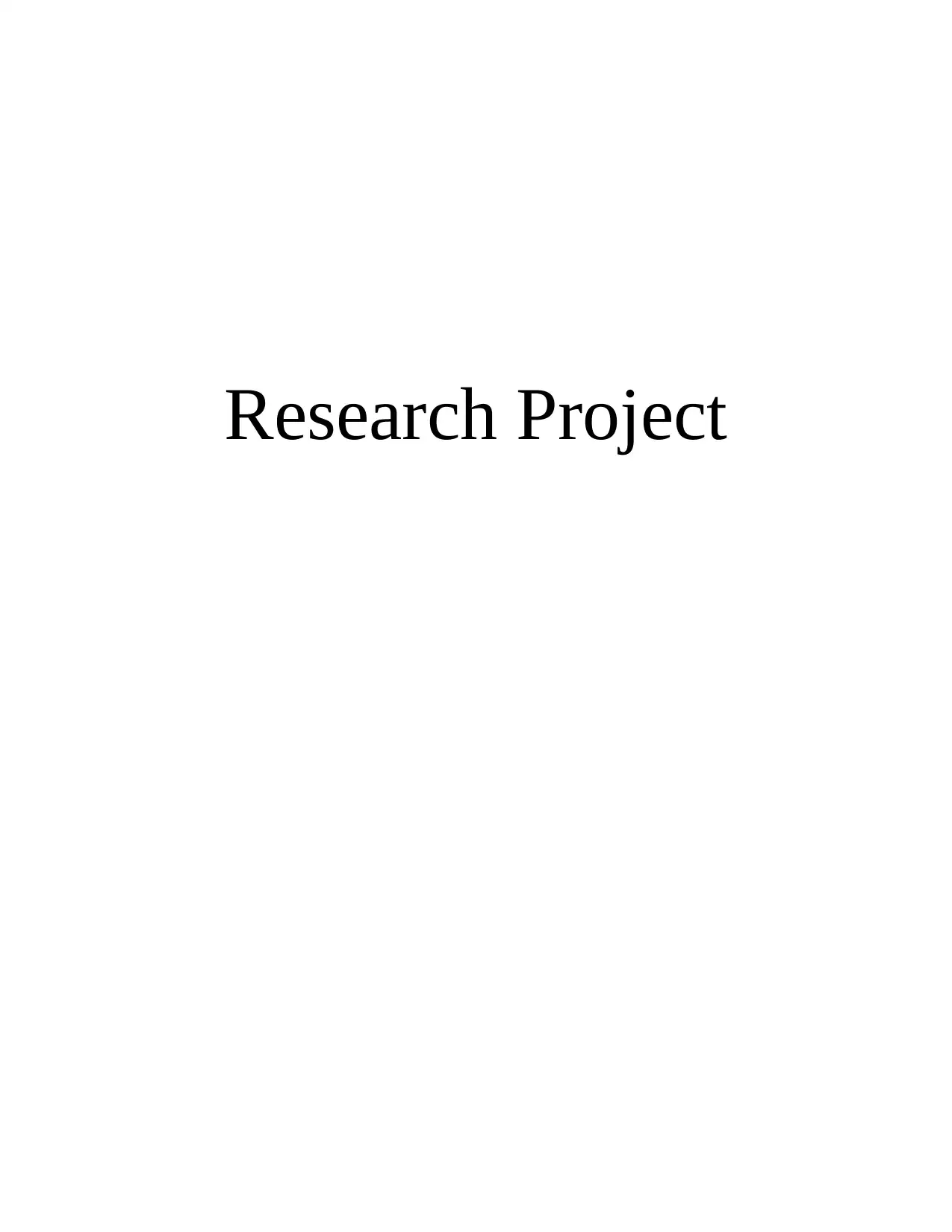
Research Project
Paraphrase This Document
Need a fresh take? Get an instant paraphrase of this document with our AI Paraphraser
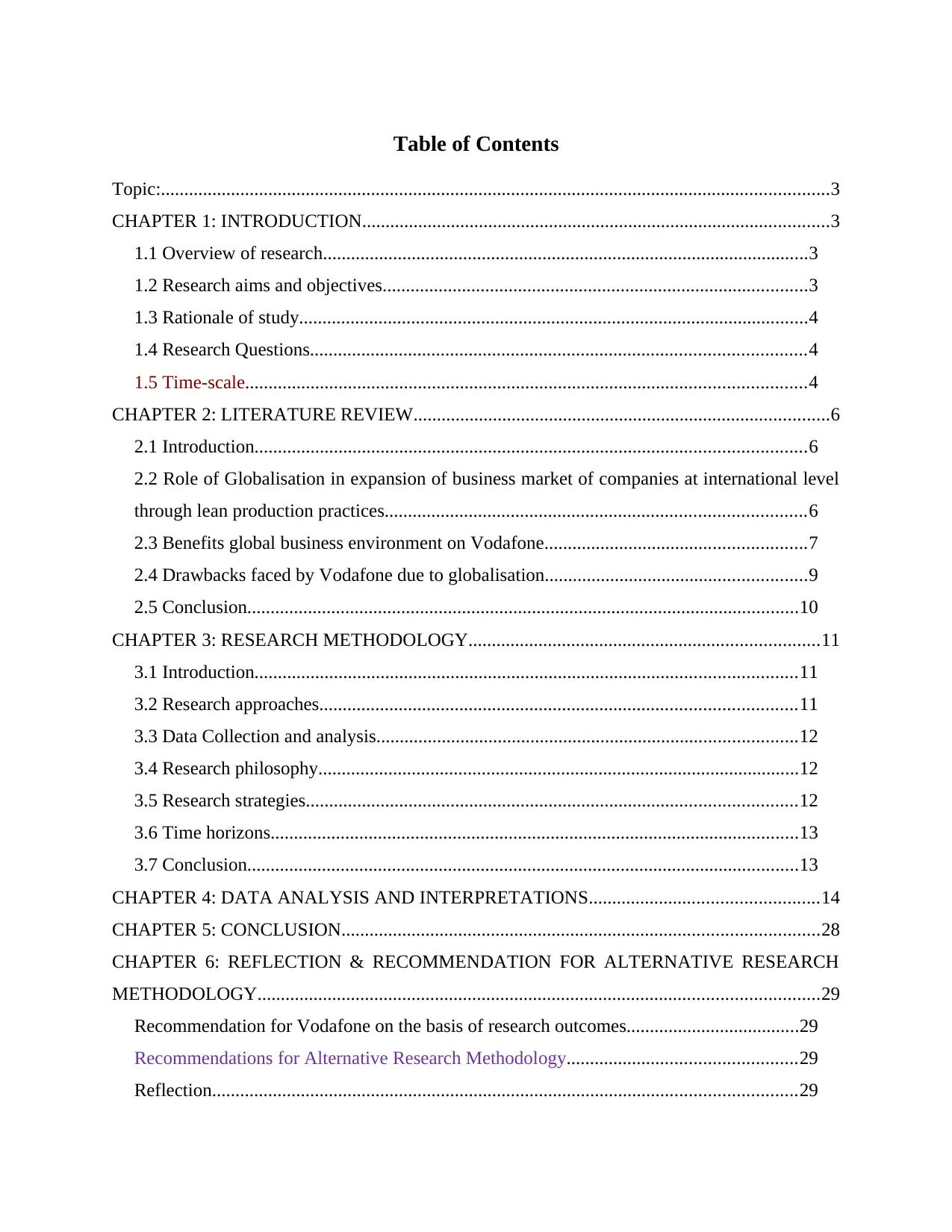
Table of Contents
Topic:...............................................................................................................................................3
CHAPTER 1: INTRODUCTION....................................................................................................3
1.1 Overview of research........................................................................................................3
1.2 Research aims and objectives...........................................................................................3
1.3 Rationale of study.............................................................................................................4
1.4 Research Questions..........................................................................................................4
1.5 Time-scale........................................................................................................................4
CHAPTER 2: LITERATURE REVIEW.........................................................................................6
2.1 Introduction......................................................................................................................6
2.2 Role of Globalisation in expansion of business market of companies at international level
through lean production practices..........................................................................................6
2.3 Benefits global business environment on Vodafone........................................................7
2.4 Drawbacks faced by Vodafone due to globalisation........................................................9
2.5 Conclusion......................................................................................................................10
CHAPTER 3: RESEARCH METHODOLOGY...........................................................................11
3.1 Introduction....................................................................................................................11
3.2 Research approaches......................................................................................................11
3.3 Data Collection and analysis..........................................................................................12
3.4 Research philosophy.......................................................................................................12
3.5 Research strategies.........................................................................................................12
3.6 Time horizons.................................................................................................................13
3.7 Conclusion......................................................................................................................13
CHAPTER 4: DATA ANALYSIS AND INTERPRETATIONS.................................................14
CHAPTER 5: CONCLUSION......................................................................................................28
CHAPTER 6: REFLECTION & RECOMMENDATION FOR ALTERNATIVE RESEARCH
METHODOLOGY........................................................................................................................29
Recommendation for Vodafone on the basis of research outcomes.....................................29
Recommendations for Alternative Research Methodology.................................................29
Reflection.............................................................................................................................29
Topic:...............................................................................................................................................3
CHAPTER 1: INTRODUCTION....................................................................................................3
1.1 Overview of research........................................................................................................3
1.2 Research aims and objectives...........................................................................................3
1.3 Rationale of study.............................................................................................................4
1.4 Research Questions..........................................................................................................4
1.5 Time-scale........................................................................................................................4
CHAPTER 2: LITERATURE REVIEW.........................................................................................6
2.1 Introduction......................................................................................................................6
2.2 Role of Globalisation in expansion of business market of companies at international level
through lean production practices..........................................................................................6
2.3 Benefits global business environment on Vodafone........................................................7
2.4 Drawbacks faced by Vodafone due to globalisation........................................................9
2.5 Conclusion......................................................................................................................10
CHAPTER 3: RESEARCH METHODOLOGY...........................................................................11
3.1 Introduction....................................................................................................................11
3.2 Research approaches......................................................................................................11
3.3 Data Collection and analysis..........................................................................................12
3.4 Research philosophy.......................................................................................................12
3.5 Research strategies.........................................................................................................12
3.6 Time horizons.................................................................................................................13
3.7 Conclusion......................................................................................................................13
CHAPTER 4: DATA ANALYSIS AND INTERPRETATIONS.................................................14
CHAPTER 5: CONCLUSION......................................................................................................28
CHAPTER 6: REFLECTION & RECOMMENDATION FOR ALTERNATIVE RESEARCH
METHODOLOGY........................................................................................................................29
Recommendation for Vodafone on the basis of research outcomes.....................................29
Recommendations for Alternative Research Methodology.................................................29
Reflection.............................................................................................................................29
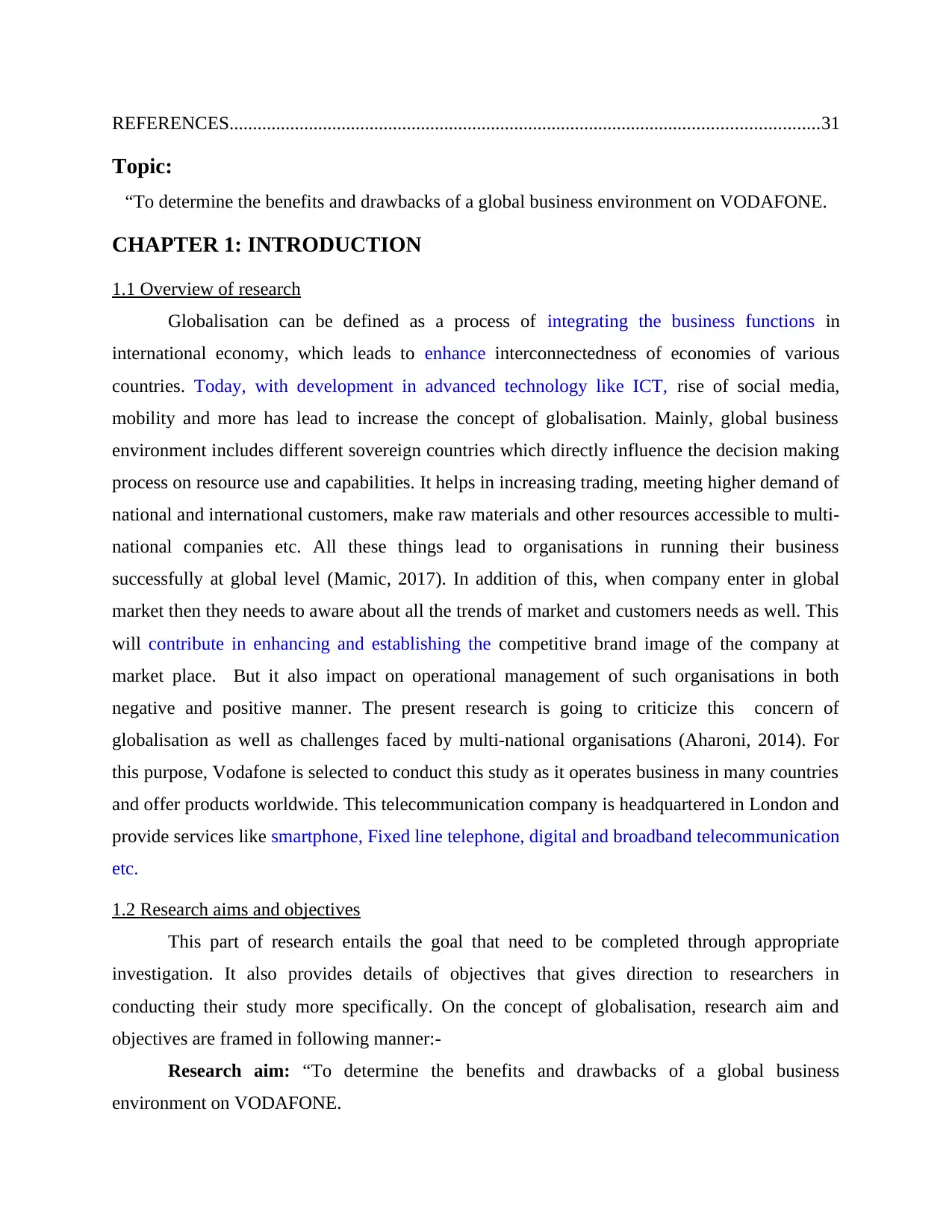
REFERENCES..............................................................................................................................31
Topic:
“To determine the benefits and drawbacks of a global business environment on VODAFONE.
CHAPTER 1: INTRODUCTION
1.1 Overview of research
Globalisation can be defined as a process of integrating the business functions in
international economy, which leads to enhance interconnectedness of economies of various
countries. Today, with development in advanced technology like ICT, rise of social media,
mobility and more has lead to increase the concept of globalisation. Mainly, global business
environment includes different sovereign countries which directly influence the decision making
process on resource use and capabilities. It helps in increasing trading, meeting higher demand of
national and international customers, make raw materials and other resources accessible to multi-
national companies etc. All these things lead to organisations in running their business
successfully at global level (Mamic, 2017). In addition of this, when company enter in global
market then they needs to aware about all the trends of market and customers needs as well. This
will contribute in enhancing and establishing the competitive brand image of the company at
market place. But it also impact on operational management of such organisations in both
negative and positive manner. The present research is going to criticize this concern of
globalisation as well as challenges faced by multi-national organisations (Aharoni, 2014). For
this purpose, Vodafone is selected to conduct this study as it operates business in many countries
and offer products worldwide. This telecommunication company is headquartered in London and
provide services like smartphone, Fixed line telephone, digital and broadband telecommunication
etc.
1.2 Research aims and objectives
This part of research entails the goal that need to be completed through appropriate
investigation. It also provides details of objectives that gives direction to researchers in
conducting their study more specifically. On the concept of globalisation, research aim and
objectives are framed in following manner:-
Research aim: “To determine the benefits and drawbacks of a global business
environment on VODAFONE.
Topic:
“To determine the benefits and drawbacks of a global business environment on VODAFONE.
CHAPTER 1: INTRODUCTION
1.1 Overview of research
Globalisation can be defined as a process of integrating the business functions in
international economy, which leads to enhance interconnectedness of economies of various
countries. Today, with development in advanced technology like ICT, rise of social media,
mobility and more has lead to increase the concept of globalisation. Mainly, global business
environment includes different sovereign countries which directly influence the decision making
process on resource use and capabilities. It helps in increasing trading, meeting higher demand of
national and international customers, make raw materials and other resources accessible to multi-
national companies etc. All these things lead to organisations in running their business
successfully at global level (Mamic, 2017). In addition of this, when company enter in global
market then they needs to aware about all the trends of market and customers needs as well. This
will contribute in enhancing and establishing the competitive brand image of the company at
market place. But it also impact on operational management of such organisations in both
negative and positive manner. The present research is going to criticize this concern of
globalisation as well as challenges faced by multi-national organisations (Aharoni, 2014). For
this purpose, Vodafone is selected to conduct this study as it operates business in many countries
and offer products worldwide. This telecommunication company is headquartered in London and
provide services like smartphone, Fixed line telephone, digital and broadband telecommunication
etc.
1.2 Research aims and objectives
This part of research entails the goal that need to be completed through appropriate
investigation. It also provides details of objectives that gives direction to researchers in
conducting their study more specifically. On the concept of globalisation, research aim and
objectives are framed in following manner:-
Research aim: “To determine the benefits and drawbacks of a global business
environment on VODAFONE.
⊘ This is a preview!⊘
Do you want full access?
Subscribe today to unlock all pages.

Trusted by 1+ million students worldwide
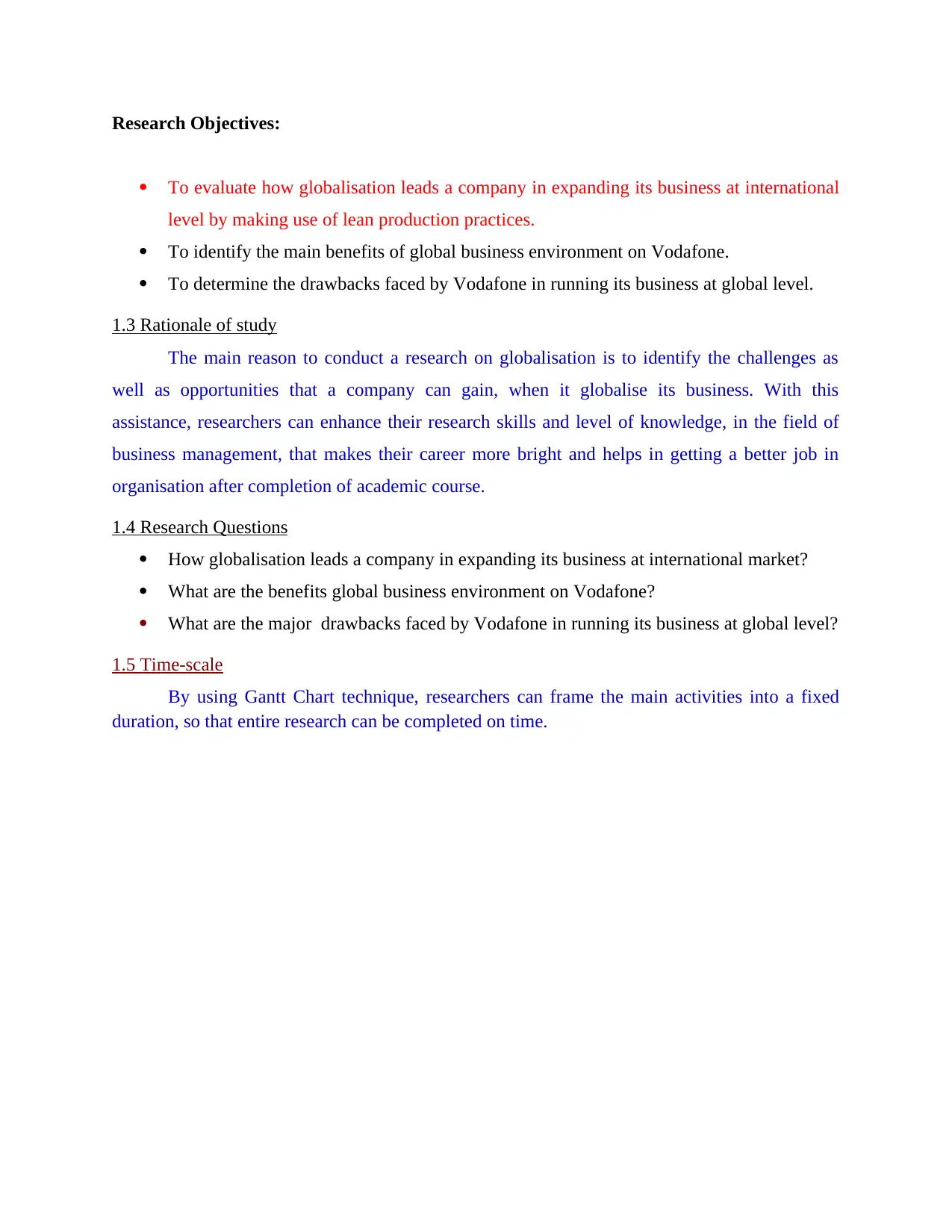
Research Objectives:
To evaluate how globalisation leads a company in expanding its business at international
level by making use of lean production practices.
To identify the main benefits of global business environment on Vodafone.
To determine the drawbacks faced by Vodafone in running its business at global level.
1.3 Rationale of study
The main reason to conduct a research on globalisation is to identify the challenges as
well as opportunities that a company can gain, when it globalise its business. With this
assistance, researchers can enhance their research skills and level of knowledge, in the field of
business management, that makes their career more bright and helps in getting a better job in
organisation after completion of academic course.
1.4 Research Questions
How globalisation leads a company in expanding its business at international market?
What are the benefits global business environment on Vodafone?
What are the major drawbacks faced by Vodafone in running its business at global level?
1.5 Time-scale
By using Gantt Chart technique, researchers can frame the main activities into a fixed
duration, so that entire research can be completed on time.
To evaluate how globalisation leads a company in expanding its business at international
level by making use of lean production practices.
To identify the main benefits of global business environment on Vodafone.
To determine the drawbacks faced by Vodafone in running its business at global level.
1.3 Rationale of study
The main reason to conduct a research on globalisation is to identify the challenges as
well as opportunities that a company can gain, when it globalise its business. With this
assistance, researchers can enhance their research skills and level of knowledge, in the field of
business management, that makes their career more bright and helps in getting a better job in
organisation after completion of academic course.
1.4 Research Questions
How globalisation leads a company in expanding its business at international market?
What are the benefits global business environment on Vodafone?
What are the major drawbacks faced by Vodafone in running its business at global level?
1.5 Time-scale
By using Gantt Chart technique, researchers can frame the main activities into a fixed
duration, so that entire research can be completed on time.
Paraphrase This Document
Need a fresh take? Get an instant paraphrase of this document with our AI Paraphraser
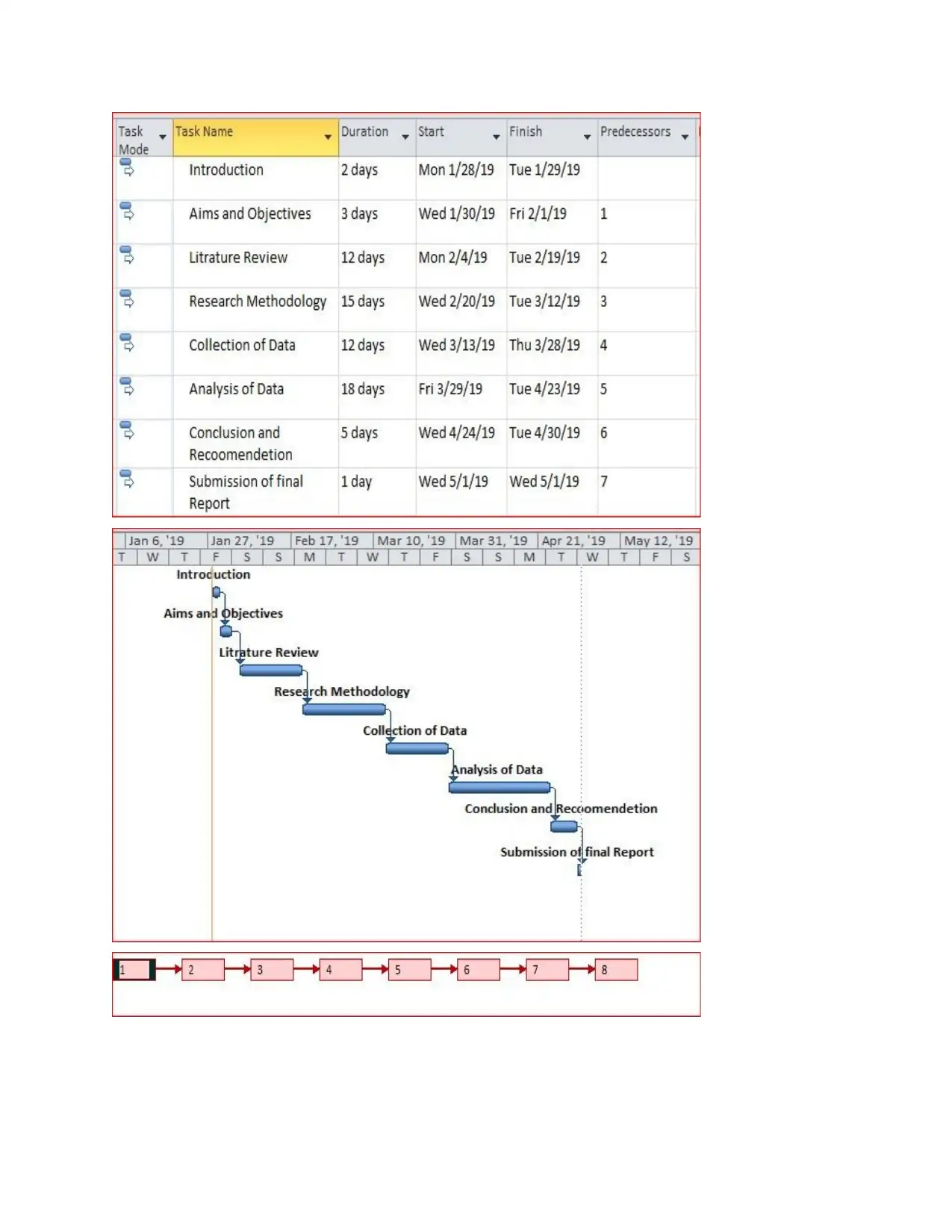
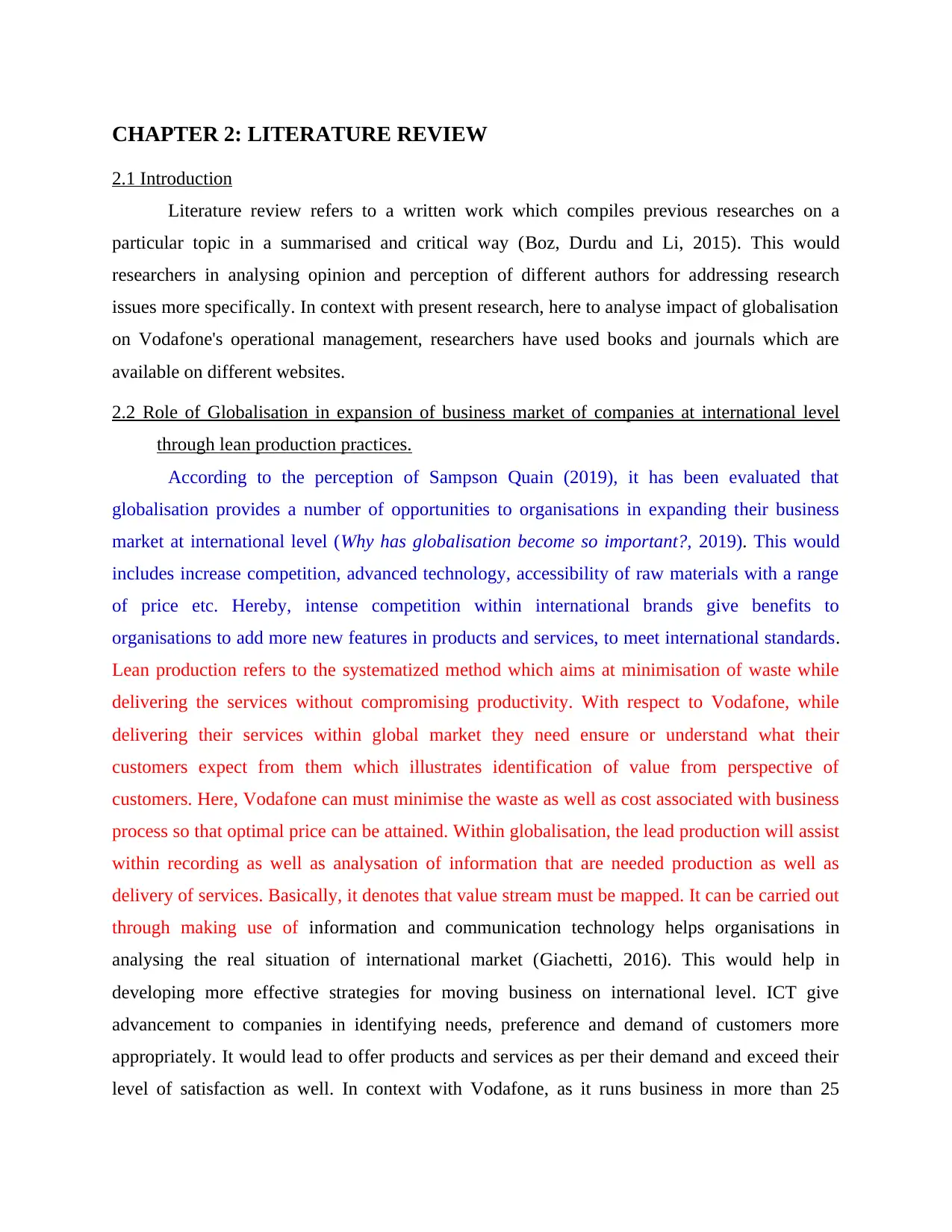
CHAPTER 2: LITERATURE REVIEW
2.1 Introduction
Literature review refers to a written work which compiles previous researches on a
particular topic in a summarised and critical way (Boz, Durdu and Li, 2015). This would
researchers in analysing opinion and perception of different authors for addressing research
issues more specifically. In context with present research, here to analyse impact of globalisation
on Vodafone's operational management, researchers have used books and journals which are
available on different websites.
2.2 Role of Globalisation in expansion of business market of companies at international level
through lean production practices.
According to the perception of Sampson Quain (2019), it has been evaluated that
globalisation provides a number of opportunities to organisations in expanding their business
market at international level (Why has globalisation become so important?, 2019). This would
includes increase competition, advanced technology, accessibility of raw materials with a range
of price etc. Hereby, intense competition within international brands give benefits to
organisations to add more new features in products and services, to meet international standards.
Lean production refers to the systematized method which aims at minimisation of waste while
delivering the services without compromising productivity. With respect to Vodafone, while
delivering their services within global market they need ensure or understand what their
customers expect from them which illustrates identification of value from perspective of
customers. Here, Vodafone can must minimise the waste as well as cost associated with business
process so that optimal price can be attained. Within globalisation, the lead production will assist
within recording as well as analysation of information that are needed production as well as
delivery of services. Basically, it denotes that value stream must be mapped. It can be carried out
through making use of information and communication technology helps organisations in
analysing the real situation of international market (Giachetti, 2016). This would help in
developing more effective strategies for moving business on international level. ICT give
advancement to companies in identifying needs, preference and demand of customers more
appropriately. It would lead to offer products and services as per their demand and exceed their
level of satisfaction as well. In context with Vodafone, as it runs business in more than 25
2.1 Introduction
Literature review refers to a written work which compiles previous researches on a
particular topic in a summarised and critical way (Boz, Durdu and Li, 2015). This would
researchers in analysing opinion and perception of different authors for addressing research
issues more specifically. In context with present research, here to analyse impact of globalisation
on Vodafone's operational management, researchers have used books and journals which are
available on different websites.
2.2 Role of Globalisation in expansion of business market of companies at international level
through lean production practices.
According to the perception of Sampson Quain (2019), it has been evaluated that
globalisation provides a number of opportunities to organisations in expanding their business
market at international level (Why has globalisation become so important?, 2019). This would
includes increase competition, advanced technology, accessibility of raw materials with a range
of price etc. Hereby, intense competition within international brands give benefits to
organisations to add more new features in products and services, to meet international standards.
Lean production refers to the systematized method which aims at minimisation of waste while
delivering the services without compromising productivity. With respect to Vodafone, while
delivering their services within global market they need ensure or understand what their
customers expect from them which illustrates identification of value from perspective of
customers. Here, Vodafone can must minimise the waste as well as cost associated with business
process so that optimal price can be attained. Within globalisation, the lead production will assist
within recording as well as analysation of information that are needed production as well as
delivery of services. Basically, it denotes that value stream must be mapped. It can be carried out
through making use of information and communication technology helps organisations in
analysing the real situation of international market (Giachetti, 2016). This would help in
developing more effective strategies for moving business on international level. ICT give
advancement to companies in identifying needs, preference and demand of customers more
appropriately. It would lead to offer products and services as per their demand and exceed their
level of satisfaction as well. In context with Vodafone, as it runs business in more than 25
⊘ This is a preview!⊘
Do you want full access?
Subscribe today to unlock all pages.

Trusted by 1+ million students worldwide
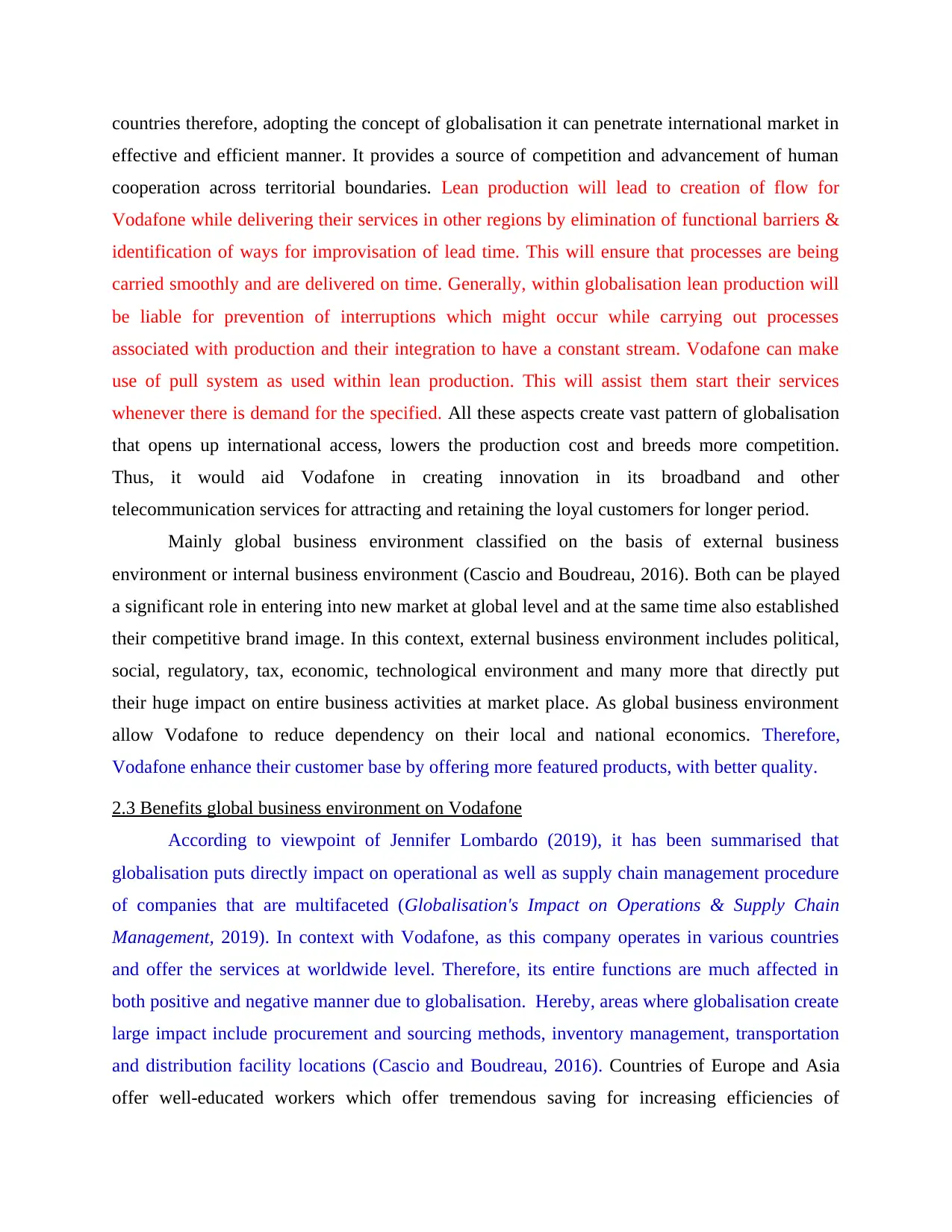
countries therefore, adopting the concept of globalisation it can penetrate international market in
effective and efficient manner. It provides a source of competition and advancement of human
cooperation across territorial boundaries. Lean production will lead to creation of flow for
Vodafone while delivering their services in other regions by elimination of functional barriers &
identification of ways for improvisation of lead time. This will ensure that processes are being
carried smoothly and are delivered on time. Generally, within globalisation lean production will
be liable for prevention of interruptions which might occur while carrying out processes
associated with production and their integration to have a constant stream. Vodafone can make
use of pull system as used within lean production. This will assist them start their services
whenever there is demand for the specified. All these aspects create vast pattern of globalisation
that opens up international access, lowers the production cost and breeds more competition.
Thus, it would aid Vodafone in creating innovation in its broadband and other
telecommunication services for attracting and retaining the loyal customers for longer period.
Mainly global business environment classified on the basis of external business
environment or internal business environment (Cascio and Boudreau, 2016). Both can be played
a significant role in entering into new market at global level and at the same time also established
their competitive brand image. In this context, external business environment includes political,
social, regulatory, tax, economic, technological environment and many more that directly put
their huge impact on entire business activities at market place. As global business environment
allow Vodafone to reduce dependency on their local and national economics. Therefore,
Vodafone enhance their customer base by offering more featured products, with better quality.
2.3 Benefits global business environment on Vodafone
According to viewpoint of Jennifer Lombardo (2019), it has been summarised that
globalisation puts directly impact on operational as well as supply chain management procedure
of companies that are multifaceted (Globalisation's Impact on Operations & Supply Chain
Management, 2019). In context with Vodafone, as this company operates in various countries
and offer the services at worldwide level. Therefore, its entire functions are much affected in
both positive and negative manner due to globalisation. Hereby, areas where globalisation create
large impact include procurement and sourcing methods, inventory management, transportation
and distribution facility locations (Cascio and Boudreau, 2016). Countries of Europe and Asia
offer well-educated workers which offer tremendous saving for increasing efficiencies of
effective and efficient manner. It provides a source of competition and advancement of human
cooperation across territorial boundaries. Lean production will lead to creation of flow for
Vodafone while delivering their services in other regions by elimination of functional barriers &
identification of ways for improvisation of lead time. This will ensure that processes are being
carried smoothly and are delivered on time. Generally, within globalisation lean production will
be liable for prevention of interruptions which might occur while carrying out processes
associated with production and their integration to have a constant stream. Vodafone can make
use of pull system as used within lean production. This will assist them start their services
whenever there is demand for the specified. All these aspects create vast pattern of globalisation
that opens up international access, lowers the production cost and breeds more competition.
Thus, it would aid Vodafone in creating innovation in its broadband and other
telecommunication services for attracting and retaining the loyal customers for longer period.
Mainly global business environment classified on the basis of external business
environment or internal business environment (Cascio and Boudreau, 2016). Both can be played
a significant role in entering into new market at global level and at the same time also established
their competitive brand image. In this context, external business environment includes political,
social, regulatory, tax, economic, technological environment and many more that directly put
their huge impact on entire business activities at market place. As global business environment
allow Vodafone to reduce dependency on their local and national economics. Therefore,
Vodafone enhance their customer base by offering more featured products, with better quality.
2.3 Benefits global business environment on Vodafone
According to viewpoint of Jennifer Lombardo (2019), it has been summarised that
globalisation puts directly impact on operational as well as supply chain management procedure
of companies that are multifaceted (Globalisation's Impact on Operations & Supply Chain
Management, 2019). In context with Vodafone, as this company operates in various countries
and offer the services at worldwide level. Therefore, its entire functions are much affected in
both positive and negative manner due to globalisation. Hereby, areas where globalisation create
large impact include procurement and sourcing methods, inventory management, transportation
and distribution facility locations (Cascio and Boudreau, 2016). Countries of Europe and Asia
offer well-educated workers which offer tremendous saving for increasing efficiencies of
Paraphrase This Document
Need a fresh take? Get an instant paraphrase of this document with our AI Paraphraser
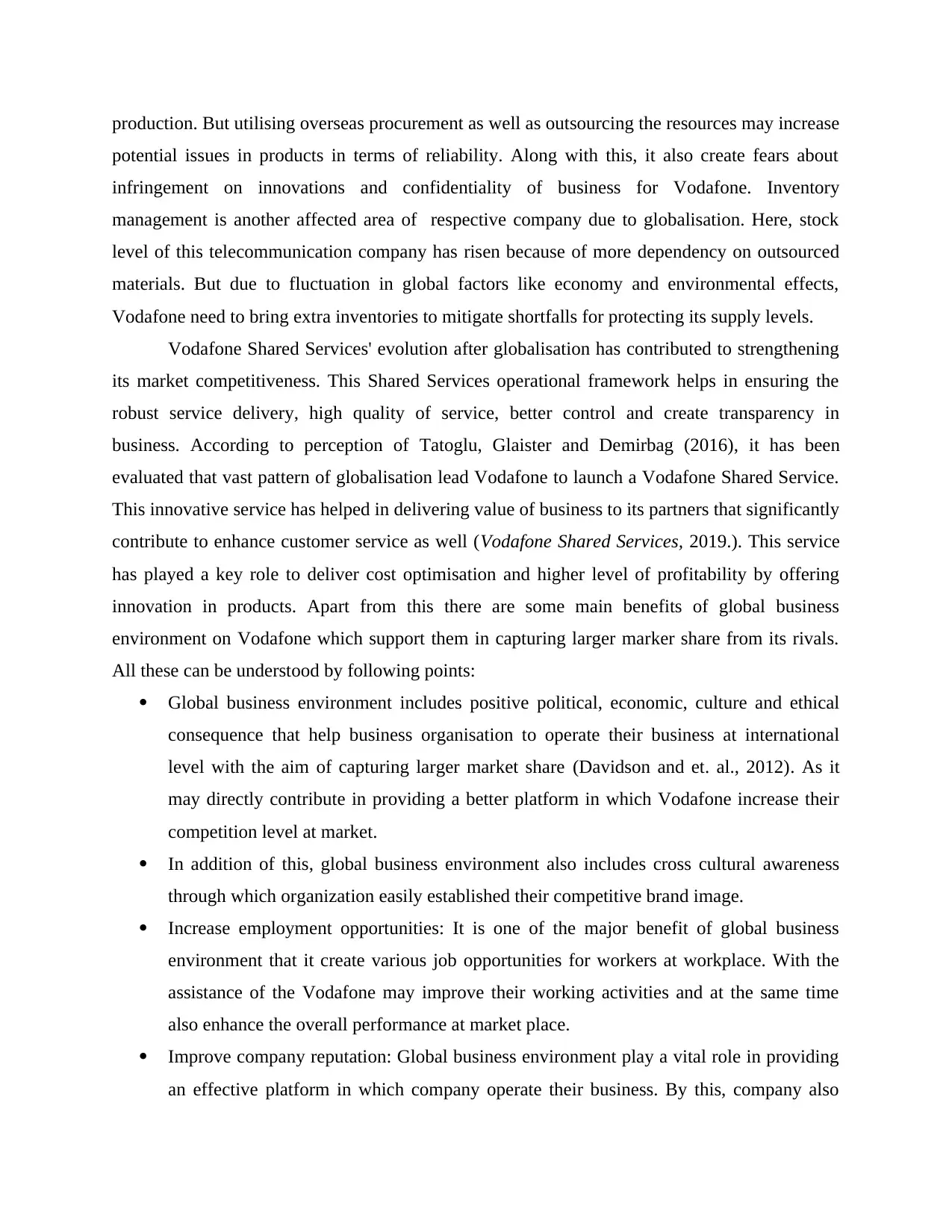
production. But utilising overseas procurement as well as outsourcing the resources may increase
potential issues in products in terms of reliability. Along with this, it also create fears about
infringement on innovations and confidentiality of business for Vodafone. Inventory
management is another affected area of respective company due to globalisation. Here, stock
level of this telecommunication company has risen because of more dependency on outsourced
materials. But due to fluctuation in global factors like economy and environmental effects,
Vodafone need to bring extra inventories to mitigate shortfalls for protecting its supply levels.
Vodafone Shared Services' evolution after globalisation has contributed to strengthening
its market competitiveness. This Shared Services operational framework helps in ensuring the
robust service delivery, high quality of service, better control and create transparency in
business. According to perception of Tatoglu, Glaister and Demirbag (2016), it has been
evaluated that vast pattern of globalisation lead Vodafone to launch a Vodafone Shared Service.
This innovative service has helped in delivering value of business to its partners that significantly
contribute to enhance customer service as well (Vodafone Shared Services, 2019.). This service
has played a key role to deliver cost optimisation and higher level of profitability by offering
innovation in products. Apart from this there are some main benefits of global business
environment on Vodafone which support them in capturing larger marker share from its rivals.
All these can be understood by following points:
Global business environment includes positive political, economic, culture and ethical
consequence that help business organisation to operate their business at international
level with the aim of capturing larger market share (Davidson and et. al., 2012). As it
may directly contribute in providing a better platform in which Vodafone increase their
competition level at market.
In addition of this, global business environment also includes cross cultural awareness
through which organization easily established their competitive brand image.
Increase employment opportunities: It is one of the major benefit of global business
environment that it create various job opportunities for workers at workplace. With the
assistance of the Vodafone may improve their working activities and at the same time
also enhance the overall performance at market place.
Improve company reputation: Global business environment play a vital role in providing
an effective platform in which company operate their business. By this, company also
potential issues in products in terms of reliability. Along with this, it also create fears about
infringement on innovations and confidentiality of business for Vodafone. Inventory
management is another affected area of respective company due to globalisation. Here, stock
level of this telecommunication company has risen because of more dependency on outsourced
materials. But due to fluctuation in global factors like economy and environmental effects,
Vodafone need to bring extra inventories to mitigate shortfalls for protecting its supply levels.
Vodafone Shared Services' evolution after globalisation has contributed to strengthening
its market competitiveness. This Shared Services operational framework helps in ensuring the
robust service delivery, high quality of service, better control and create transparency in
business. According to perception of Tatoglu, Glaister and Demirbag (2016), it has been
evaluated that vast pattern of globalisation lead Vodafone to launch a Vodafone Shared Service.
This innovative service has helped in delivering value of business to its partners that significantly
contribute to enhance customer service as well (Vodafone Shared Services, 2019.). This service
has played a key role to deliver cost optimisation and higher level of profitability by offering
innovation in products. Apart from this there are some main benefits of global business
environment on Vodafone which support them in capturing larger marker share from its rivals.
All these can be understood by following points:
Global business environment includes positive political, economic, culture and ethical
consequence that help business organisation to operate their business at international
level with the aim of capturing larger market share (Davidson and et. al., 2012). As it
may directly contribute in providing a better platform in which Vodafone increase their
competition level at market.
In addition of this, global business environment also includes cross cultural awareness
through which organization easily established their competitive brand image.
Increase employment opportunities: It is one of the major benefit of global business
environment that it create various job opportunities for workers at workplace. With the
assistance of the Vodafone may improve their working activities and at the same time
also enhance the overall performance at market place.
Improve company reputation: Global business environment play a vital role in providing
an effective platform in which company operate their business. By this, company also
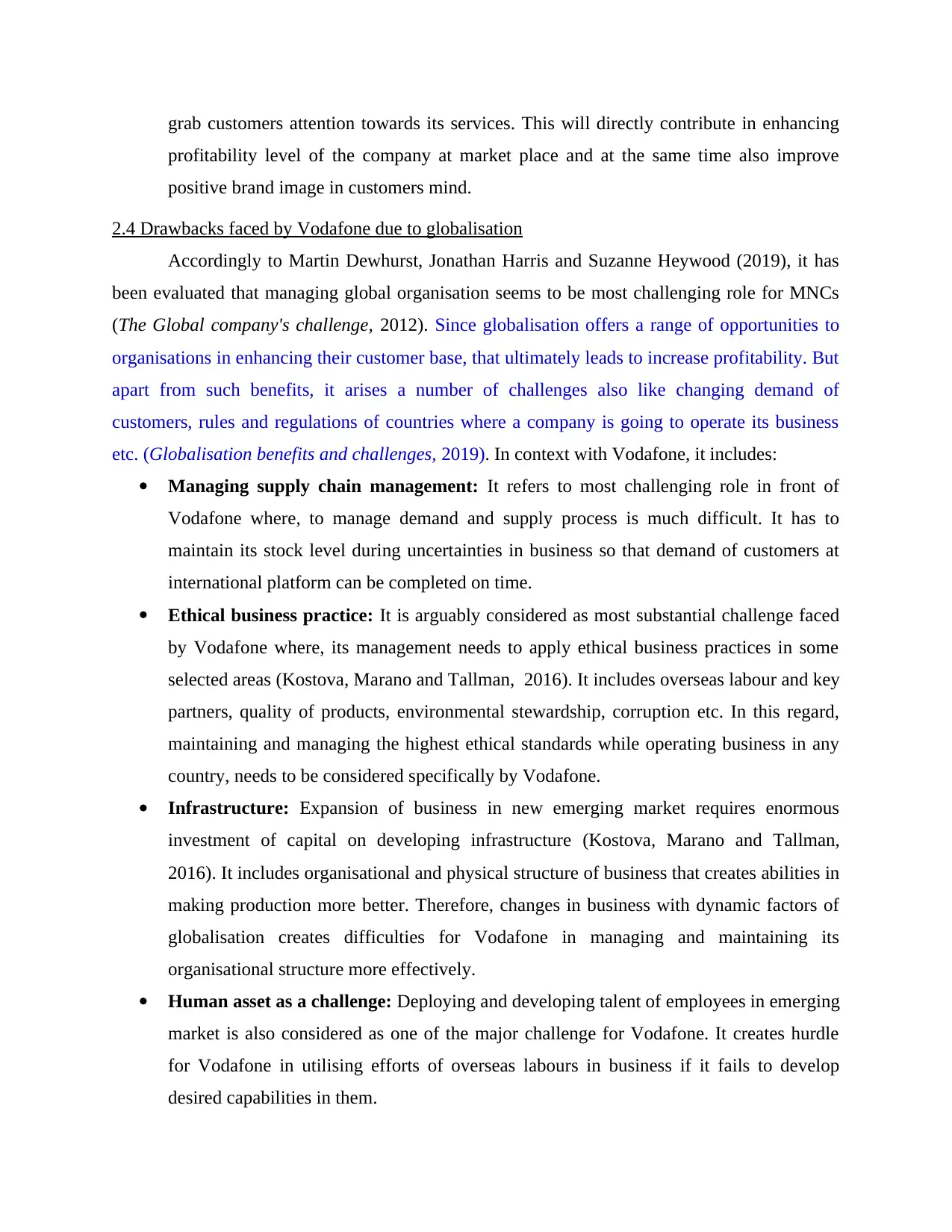
grab customers attention towards its services. This will directly contribute in enhancing
profitability level of the company at market place and at the same time also improve
positive brand image in customers mind.
2.4 Drawbacks faced by Vodafone due to globalisation
Accordingly to Martin Dewhurst, Jonathan Harris and Suzanne Heywood (2019), it has
been evaluated that managing global organisation seems to be most challenging role for MNCs
(The Global company's challenge, 2012). Since globalisation offers a range of opportunities to
organisations in enhancing their customer base, that ultimately leads to increase profitability. But
apart from such benefits, it arises a number of challenges also like changing demand of
customers, rules and regulations of countries where a company is going to operate its business
etc. (Globalisation benefits and challenges, 2019). In context with Vodafone, it includes:
Managing supply chain management: It refers to most challenging role in front of
Vodafone where, to manage demand and supply process is much difficult. It has to
maintain its stock level during uncertainties in business so that demand of customers at
international platform can be completed on time.
Ethical business practice: It is arguably considered as most substantial challenge faced
by Vodafone where, its management needs to apply ethical business practices in some
selected areas (Kostova, Marano and Tallman, 2016). It includes overseas labour and key
partners, quality of products, environmental stewardship, corruption etc. In this regard,
maintaining and managing the highest ethical standards while operating business in any
country, needs to be considered specifically by Vodafone.
Infrastructure: Expansion of business in new emerging market requires enormous
investment of capital on developing infrastructure (Kostova, Marano and Tallman,
2016). It includes organisational and physical structure of business that creates abilities in
making production more better. Therefore, changes in business with dynamic factors of
globalisation creates difficulties for Vodafone in managing and maintaining its
organisational structure more effectively.
Human asset as a challenge: Deploying and developing talent of employees in emerging
market is also considered as one of the major challenge for Vodafone. It creates hurdle
for Vodafone in utilising efforts of overseas labours in business if it fails to develop
desired capabilities in them.
profitability level of the company at market place and at the same time also improve
positive brand image in customers mind.
2.4 Drawbacks faced by Vodafone due to globalisation
Accordingly to Martin Dewhurst, Jonathan Harris and Suzanne Heywood (2019), it has
been evaluated that managing global organisation seems to be most challenging role for MNCs
(The Global company's challenge, 2012). Since globalisation offers a range of opportunities to
organisations in enhancing their customer base, that ultimately leads to increase profitability. But
apart from such benefits, it arises a number of challenges also like changing demand of
customers, rules and regulations of countries where a company is going to operate its business
etc. (Globalisation benefits and challenges, 2019). In context with Vodafone, it includes:
Managing supply chain management: It refers to most challenging role in front of
Vodafone where, to manage demand and supply process is much difficult. It has to
maintain its stock level during uncertainties in business so that demand of customers at
international platform can be completed on time.
Ethical business practice: It is arguably considered as most substantial challenge faced
by Vodafone where, its management needs to apply ethical business practices in some
selected areas (Kostova, Marano and Tallman, 2016). It includes overseas labour and key
partners, quality of products, environmental stewardship, corruption etc. In this regard,
maintaining and managing the highest ethical standards while operating business in any
country, needs to be considered specifically by Vodafone.
Infrastructure: Expansion of business in new emerging market requires enormous
investment of capital on developing infrastructure (Kostova, Marano and Tallman,
2016). It includes organisational and physical structure of business that creates abilities in
making production more better. Therefore, changes in business with dynamic factors of
globalisation creates difficulties for Vodafone in managing and maintaining its
organisational structure more effectively.
Human asset as a challenge: Deploying and developing talent of employees in emerging
market is also considered as one of the major challenge for Vodafone. It creates hurdle
for Vodafone in utilising efforts of overseas labours in business if it fails to develop
desired capabilities in them.
⊘ This is a preview!⊘
Do you want full access?
Subscribe today to unlock all pages.

Trusted by 1+ million students worldwide
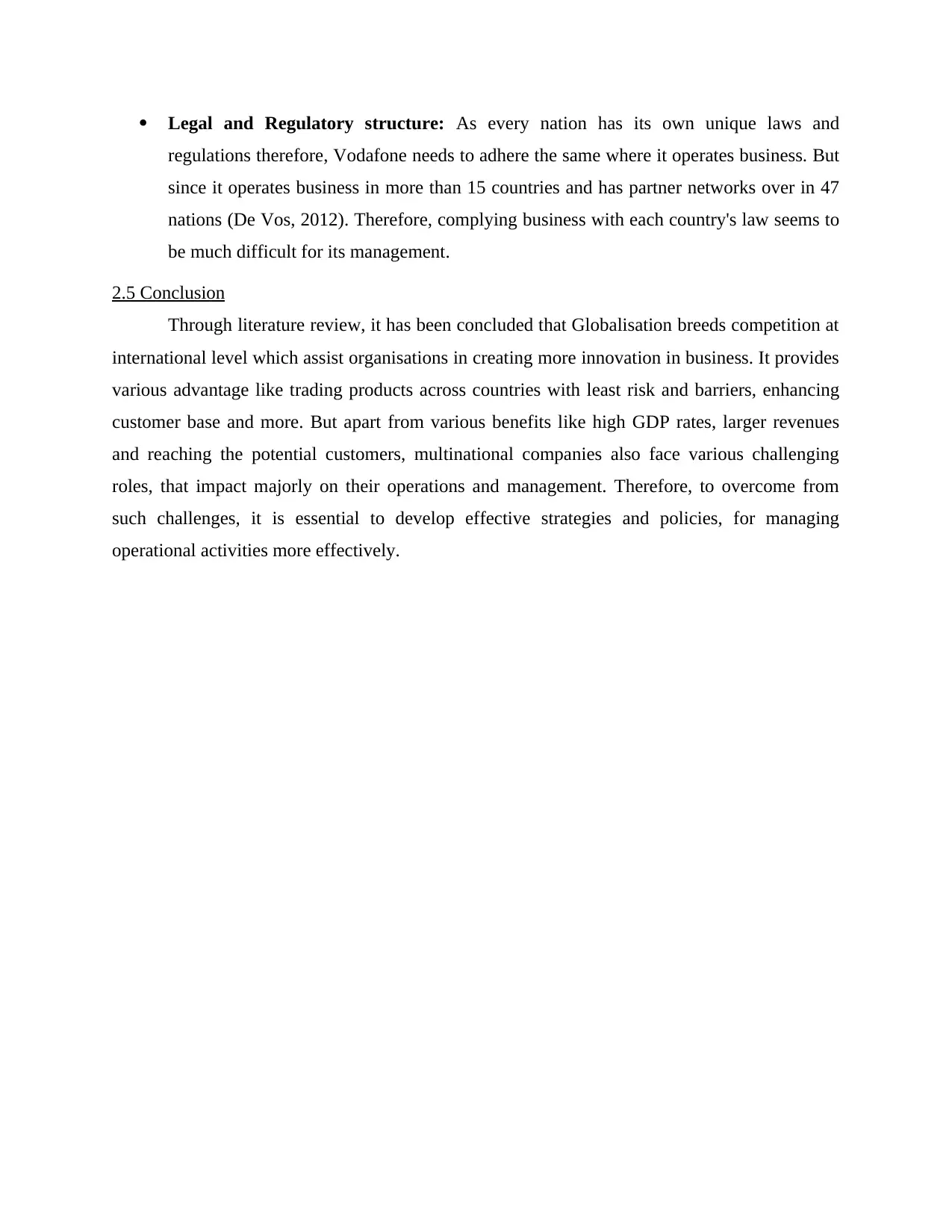
Legal and Regulatory structure: As every nation has its own unique laws and
regulations therefore, Vodafone needs to adhere the same where it operates business. But
since it operates business in more than 15 countries and has partner networks over in 47
nations (De Vos, 2012). Therefore, complying business with each country's law seems to
be much difficult for its management.
2.5 Conclusion
Through literature review, it has been concluded that Globalisation breeds competition at
international level which assist organisations in creating more innovation in business. It provides
various advantage like trading products across countries with least risk and barriers, enhancing
customer base and more. But apart from various benefits like high GDP rates, larger revenues
and reaching the potential customers, multinational companies also face various challenging
roles, that impact majorly on their operations and management. Therefore, to overcome from
such challenges, it is essential to develop effective strategies and policies, for managing
operational activities more effectively.
regulations therefore, Vodafone needs to adhere the same where it operates business. But
since it operates business in more than 15 countries and has partner networks over in 47
nations (De Vos, 2012). Therefore, complying business with each country's law seems to
be much difficult for its management.
2.5 Conclusion
Through literature review, it has been concluded that Globalisation breeds competition at
international level which assist organisations in creating more innovation in business. It provides
various advantage like trading products across countries with least risk and barriers, enhancing
customer base and more. But apart from various benefits like high GDP rates, larger revenues
and reaching the potential customers, multinational companies also face various challenging
roles, that impact majorly on their operations and management. Therefore, to overcome from
such challenges, it is essential to develop effective strategies and policies, for managing
operational activities more effectively.
Paraphrase This Document
Need a fresh take? Get an instant paraphrase of this document with our AI Paraphraser
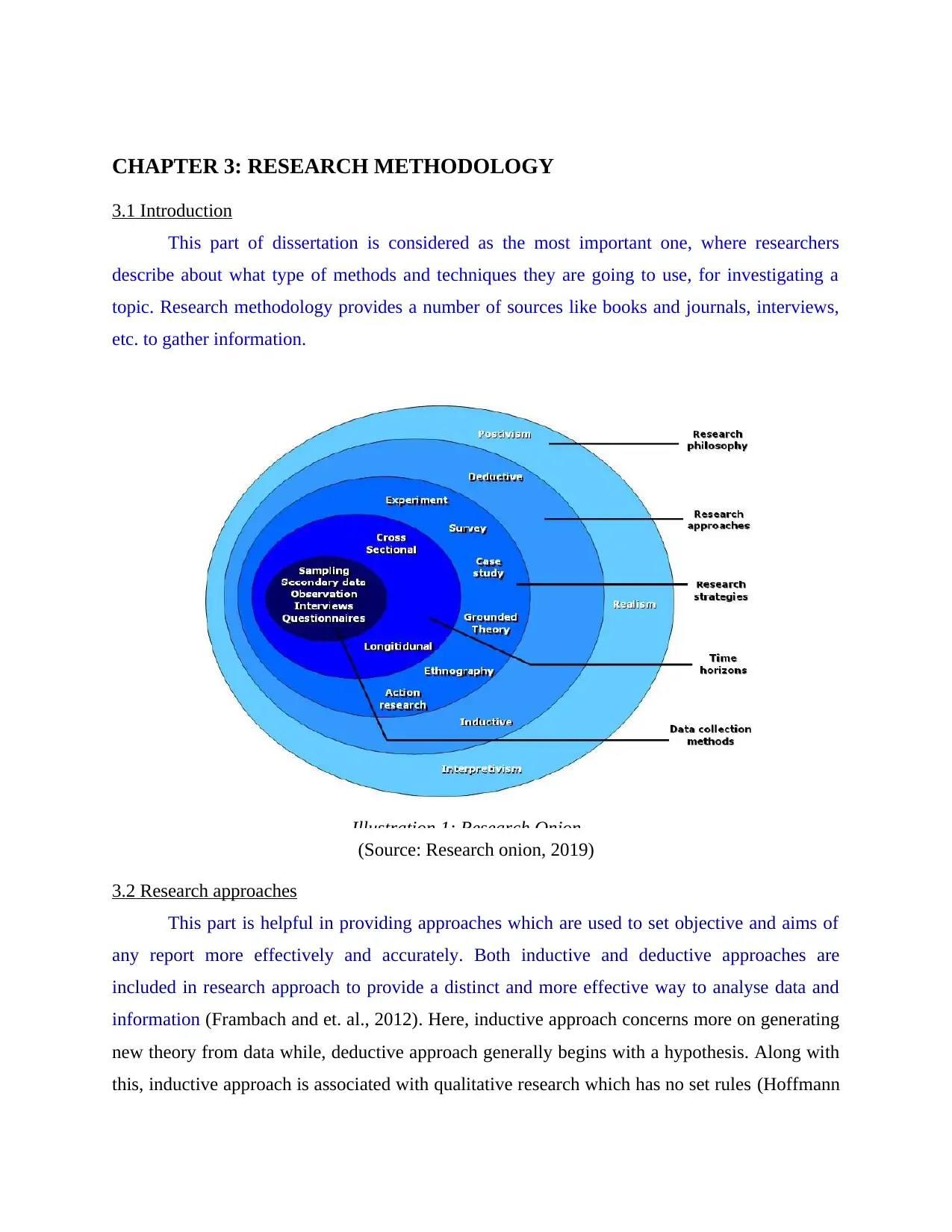
CHAPTER 3: RESEARCH METHODOLOGY
3.1 Introduction
This part of dissertation is considered as the most important one, where researchers
describe about what type of methods and techniques they are going to use, for investigating a
topic. Research methodology provides a number of sources like books and journals, interviews,
etc. to gather information.
(Source: Research onion, 2019)
3.2 Research approaches
This part is helpful in providing approaches which are used to set objective and aims of
any report more effectively and accurately. Both inductive and deductive approaches are
included in research approach to provide a distinct and more effective way to analyse data and
information (Frambach and et. al., 2012). Here, inductive approach concerns more on generating
new theory from data while, deductive approach generally begins with a hypothesis. Along with
this, inductive approach is associated with qualitative research which has no set rules (Hoffmann
Illustration 1: Research Onion
3.1 Introduction
This part of dissertation is considered as the most important one, where researchers
describe about what type of methods and techniques they are going to use, for investigating a
topic. Research methodology provides a number of sources like books and journals, interviews,
etc. to gather information.
(Source: Research onion, 2019)
3.2 Research approaches
This part is helpful in providing approaches which are used to set objective and aims of
any report more effectively and accurately. Both inductive and deductive approaches are
included in research approach to provide a distinct and more effective way to analyse data and
information (Frambach and et. al., 2012). Here, inductive approach concerns more on generating
new theory from data while, deductive approach generally begins with a hypothesis. Along with
this, inductive approach is associated with qualitative research which has no set rules (Hoffmann
Illustration 1: Research Onion
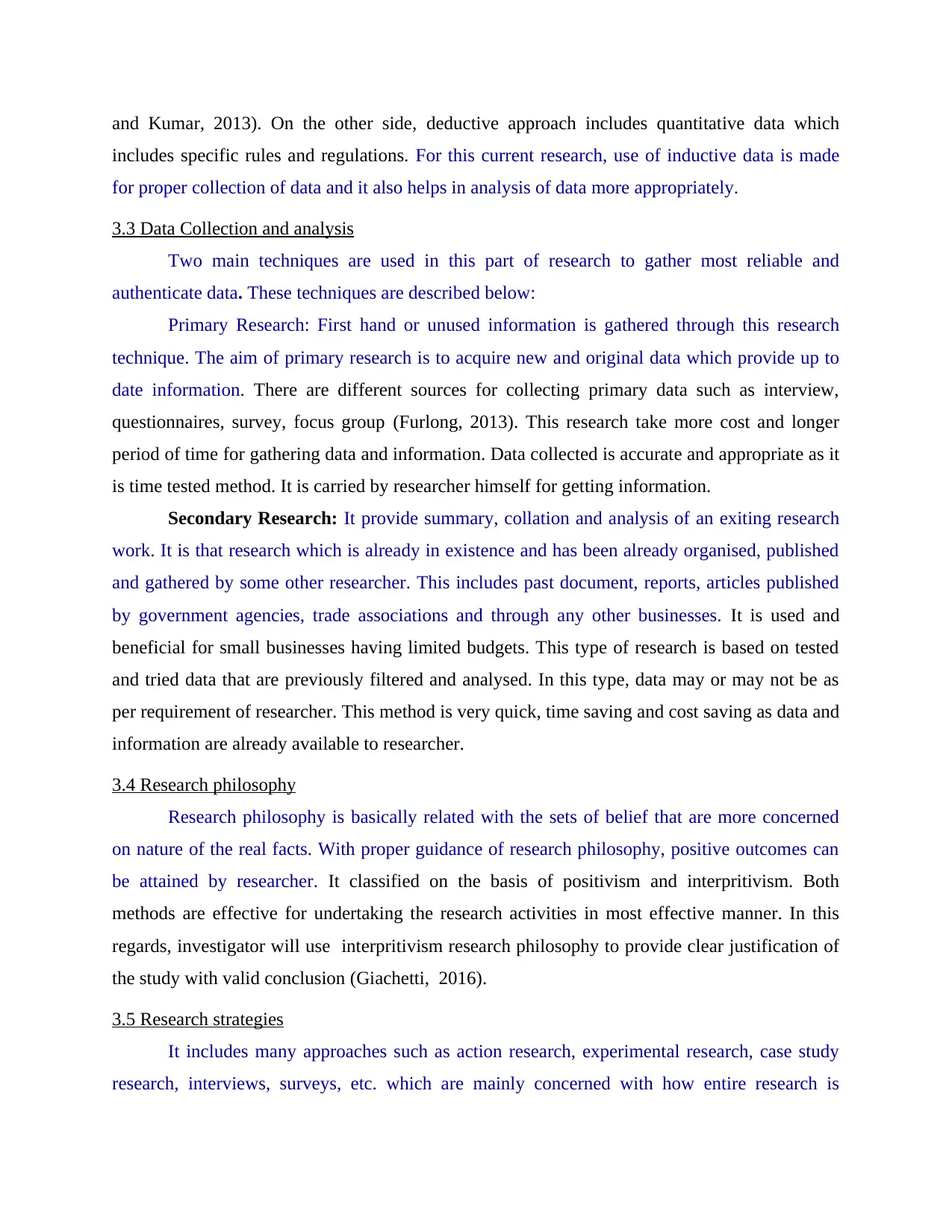
and Kumar, 2013). On the other side, deductive approach includes quantitative data which
includes specific rules and regulations. For this current research, use of inductive data is made
for proper collection of data and it also helps in analysis of data more appropriately.
3.3 Data Collection and analysis
Two main techniques are used in this part of research to gather most reliable and
authenticate data. These techniques are described below:
Primary Research: First hand or unused information is gathered through this research
technique. The aim of primary research is to acquire new and original data which provide up to
date information. There are different sources for collecting primary data such as interview,
questionnaires, survey, focus group (Furlong, 2013). This research take more cost and longer
period of time for gathering data and information. Data collected is accurate and appropriate as it
is time tested method. It is carried by researcher himself for getting information.
Secondary Research: It provide summary, collation and analysis of an exiting research
work. It is that research which is already in existence and has been already organised, published
and gathered by some other researcher. This includes past document, reports, articles published
by government agencies, trade associations and through any other businesses. It is used and
beneficial for small businesses having limited budgets. This type of research is based on tested
and tried data that are previously filtered and analysed. In this type, data may or may not be as
per requirement of researcher. This method is very quick, time saving and cost saving as data and
information are already available to researcher.
3.4 Research philosophy
Research philosophy is basically related with the sets of belief that are more concerned
on nature of the real facts. With proper guidance of research philosophy, positive outcomes can
be attained by researcher. It classified on the basis of positivism and interpritivism. Both
methods are effective for undertaking the research activities in most effective manner. In this
regards, investigator will use interpritivism research philosophy to provide clear justification of
the study with valid conclusion (Giachetti, 2016).
3.5 Research strategies
It includes many approaches such as action research, experimental research, case study
research, interviews, surveys, etc. which are mainly concerned with how entire research is
includes specific rules and regulations. For this current research, use of inductive data is made
for proper collection of data and it also helps in analysis of data more appropriately.
3.3 Data Collection and analysis
Two main techniques are used in this part of research to gather most reliable and
authenticate data. These techniques are described below:
Primary Research: First hand or unused information is gathered through this research
technique. The aim of primary research is to acquire new and original data which provide up to
date information. There are different sources for collecting primary data such as interview,
questionnaires, survey, focus group (Furlong, 2013). This research take more cost and longer
period of time for gathering data and information. Data collected is accurate and appropriate as it
is time tested method. It is carried by researcher himself for getting information.
Secondary Research: It provide summary, collation and analysis of an exiting research
work. It is that research which is already in existence and has been already organised, published
and gathered by some other researcher. This includes past document, reports, articles published
by government agencies, trade associations and through any other businesses. It is used and
beneficial for small businesses having limited budgets. This type of research is based on tested
and tried data that are previously filtered and analysed. In this type, data may or may not be as
per requirement of researcher. This method is very quick, time saving and cost saving as data and
information are already available to researcher.
3.4 Research philosophy
Research philosophy is basically related with the sets of belief that are more concerned
on nature of the real facts. With proper guidance of research philosophy, positive outcomes can
be attained by researcher. It classified on the basis of positivism and interpritivism. Both
methods are effective for undertaking the research activities in most effective manner. In this
regards, investigator will use interpritivism research philosophy to provide clear justification of
the study with valid conclusion (Giachetti, 2016).
3.5 Research strategies
It includes many approaches such as action research, experimental research, case study
research, interviews, surveys, etc. which are mainly concerned with how entire research is
⊘ This is a preview!⊘
Do you want full access?
Subscribe today to unlock all pages.

Trusted by 1+ million students worldwide
1 out of 31
Related Documents
Your All-in-One AI-Powered Toolkit for Academic Success.
+13062052269
info@desklib.com
Available 24*7 on WhatsApp / Email
![[object Object]](/_next/static/media/star-bottom.7253800d.svg)
Unlock your academic potential
Copyright © 2020–2026 A2Z Services. All Rights Reserved. Developed and managed by ZUCOL.




